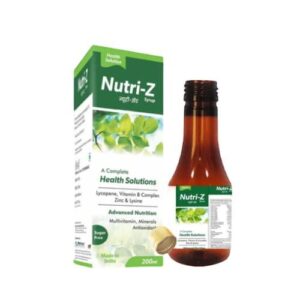ANTIOXIDANT + MULTIMINERALS + MULTIVITAMIN
Antioxidant: Drug Name: Antioxidant
Use: Antioxidants are substances that help protect the body’s cells from damage caused by free radicals. They are commonly used to prevent or slow down the damage caused by oxidative stress, which is associated with various health conditions such as cancer, cardiovascular disease, and aging.
Mechanism of Action: Antioxidants work by neutralizing free radicals, which are highly reactive molecules that can cause oxidative damage to cells. Free radicals are produced naturally as part of the body’s metabolic processes, but exposure to environmental factors such as pollution, radiation, and certain chemicals can increase their production. Antioxidants donate electrons to neutralize free radicals, preventing them from causing harm to cells and reducing the risk of cell damage and inflammation.
Dose: The dosage of antioxidants can vary depending on the specific compound being used and the individual’s health condition. Antioxidants are available as supplements in various forms, including vitamins (such as vitamin C, vitamin E, and beta-carotene), minerals (such as selenium and zinc), and other natural compounds (such as resveratrol and coenzyme Q10). It is important to follow the recommended dosage guidelines on the product label, or as prescribed by a healthcare professional.
Side Effects: In general, antioxidants are considered safe when consumed in appropriate doses. However, excessive intake of certain antioxidants, especially through supplements, may have adverse effects. For example, high doses of vitamin C may cause gastrointestinal disturbances such as diarrhea, nausea, and stomach cramps. Vitamin E can interfere with blood clotting and may increase the risk of bleeding in individuals taking blood-thinning medications. It’s also important to note that the potential benefits of antioxidants may vary depending on the individual’s health status and the specific condition being targeted. It is recommended to consult with a healthcare professional before starting antioxidant supplementation, especially if you have any pre-existing medical conditions or are taking other medications.
Multiminerals: Multiminerals is a supplement that contains a combination of essential minerals needed for the normal functioning of the body. It is used to prevent or treat mineral deficiencies, which can occur due to a variety of reasons including poor diet, certain medical conditions, or as a result of specific medications.
The mechanism of action of multiminerals is quite straightforward. It provides the body with the minerals it needs to support various bodily functions. These minerals play important roles in bone health, nerve conduction, muscle function, electrolyte balance, enzyme activity, and many other biological processes. By replenishing the mineral stores in the body, multiminerals help maintain optimal health and support overall wellbeing.
The recommended dose of multiminerals can vary depending on the brand and specific formulation. It is typically taken orally with a glass of water, usually with meals to enhance absorption. It is important to follow the instructions provided by the manufacturer or as directed by a healthcare professional to ensure appropriate dosing.
Side effects associated with multiminerals are generally rare and usually occur when taken in excessive amounts. These side effects can include gastrointestinal disturbances such as nausea, vomiting, diarrhea, or constipation. In some cases, an allergic reaction may occur, resulting in symptoms like rash, itching, or swelling. If any of these side effects persist or worsen, it is important to seek medical attention.
It is worth noting that multiminerals may interact with certain medications, including antibiotics, thyroid medications, and medications used to treat osteoporosis. Therefore, it is important to inform your healthcare provider about all the medications you are taking before starting multiminerals to avoid any potential drug interactions.
Overall, multiminerals are generally safe when taken as directed. However, it is always recommended to consult with a healthcare professional before starting any new supplement or medication to ensure it is appropriate for your specific health needs.
Multivitamin: Drug Name: Multivitamin
Use: Multivitamins are dietary supplements that contain a combination of vitamins and minerals. They are used to prevent or treat vitamin deficiency in individuals who have an inadequate intake of these essential nutrients through their diet. Multivitamins can also be recommended for specific health conditions or during specific life stages, such as pregnancy or old age.
Mechanism of Action: The mechanism of action of multivitamins is to provide essential vitamins and minerals that are necessary for the proper functioning of the body. Each vitamin and mineral has a specific role in maintaining various processes, such as cell growth, energy production, metabolism, and immune function. By providing these nutrients, multivitamins help in ensuring that the body has an adequate supply to support overall health.
Dose: The recommended dose of multivitamins varies depending on the brand and the specific formulation. It is crucial to follow the instructions on the label or as prescribed by a healthcare professional. Typically, multivitamins are taken once daily with a meal to aid in absorption. It is important not to exceed the recommended dose, as excessive intake of certain vitamins and minerals can be harmful.
Side Effects: Multivitamins are generally considered safe when taken as directed. However, some individuals may experience mild side effects, including upset stomach, nausea, or diarrhea. If these symptoms persist or worsen, it is advisable to consult a healthcare professional. In rare cases, some individuals may be allergic to certain vitamins or minerals present in the multivitamin formulation, leading to more severe allergic reactions. It is important to read the ingredient list carefully and seek medical advice if any allergic reactions occur.
It is worth noting that while multivitamins can be beneficial for individuals with vitamin deficiencies or specific health conditions, they are not a substitute for a healthy diet. It is always recommended to obtain essential nutrients through a well-balanced diet, and supplementation should be used in conjunction with proper nutrition and under the guidance of a healthcare professional.

